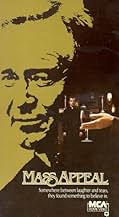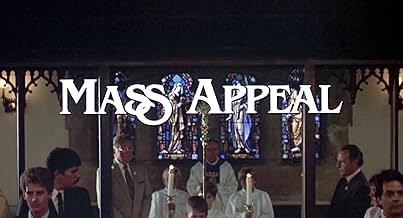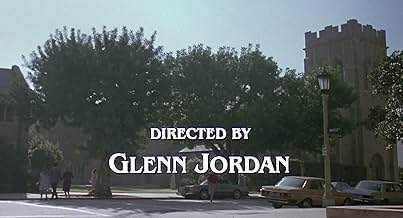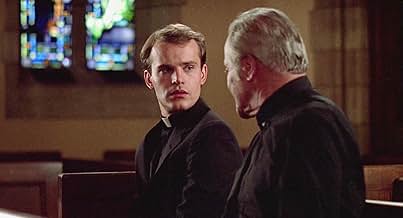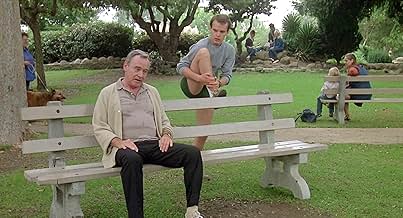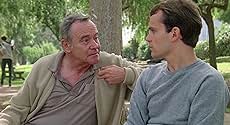IMDb-BEWERTUNG
6,7/10
1178
IHRE BEWERTUNG
Füge eine Handlung in deiner Sprache hinzuA popular Connecticut priest shields a seminary rebel from the wrath of a stern monsignor.A popular Connecticut priest shields a seminary rebel from the wrath of a stern monsignor.A popular Connecticut priest shields a seminary rebel from the wrath of a stern monsignor.
- Auszeichnungen
- 1 wins total
Empfohlene Bewertungen
The Catholic Church is as much, if not more, political than it is spiritual. As a young Catholic boy considering the priesthood yet conflicted between my own feelings and myself and that which the Church demanded, in the end I decided to go to high school instead of entering the Seminary.
I saw this movie as a young lay man. There was such a resonance for me as a Catholic and as a young man struggling with the Church, sexuality, and spirituality.
The pastor (Lemmon) was very much the pastor of a parish that was part of my experience. As much as he was devoted to his calling, he was also responsible for the political games that are played in everyone's life. The young seminarian (Ivenek) was honest, open and young with new ideas; everything the Church wanted to suppress.
The pastor wanted nothing more than to continue his comfortable position in his parish. He was assigned a new priest-to-be who had shown himself to be a bit of a radical at the seminary. It's not to be ignored the "office politics" that were in place in the assignment.
The elder was being punished and tested, so to speak, with the assignment of this younger priest. He did his best to impose his wisdom on the younger; but the younger sought spirituality more than acceptance of the status quo. In other words, he ruffled parishioners' feathers.
When complaints were lodged about this young radical priest, his sexuality came into question. What those "powers that be" were concerned about was this young priest's sermons and indictments of false spirituality dressed up as devotion. After all, if the Church had ever really been concerned with sexuality, there'd not have been a molestation of any alter boy.
This film shows how the Church picks and chooses who to persecute. Persecution of the parish priest for not playing the political games, persecution of the young seminarian who desires to spread the Word of God.
It also indicts us as parishioners. Do we go to church to be told what we want to hear or are we there to hear God's truth? Should our contributions to the collection plate influence what we hear; or should the Word of God actually mean something? This is a memorable movie in that it makes us think about what brings us to Church.
I saw this movie as a young lay man. There was such a resonance for me as a Catholic and as a young man struggling with the Church, sexuality, and spirituality.
The pastor (Lemmon) was very much the pastor of a parish that was part of my experience. As much as he was devoted to his calling, he was also responsible for the political games that are played in everyone's life. The young seminarian (Ivenek) was honest, open and young with new ideas; everything the Church wanted to suppress.
The pastor wanted nothing more than to continue his comfortable position in his parish. He was assigned a new priest-to-be who had shown himself to be a bit of a radical at the seminary. It's not to be ignored the "office politics" that were in place in the assignment.
The elder was being punished and tested, so to speak, with the assignment of this younger priest. He did his best to impose his wisdom on the younger; but the younger sought spirituality more than acceptance of the status quo. In other words, he ruffled parishioners' feathers.
When complaints were lodged about this young radical priest, his sexuality came into question. What those "powers that be" were concerned about was this young priest's sermons and indictments of false spirituality dressed up as devotion. After all, if the Church had ever really been concerned with sexuality, there'd not have been a molestation of any alter boy.
This film shows how the Church picks and chooses who to persecute. Persecution of the parish priest for not playing the political games, persecution of the young seminarian who desires to spread the Word of God.
It also indicts us as parishioners. Do we go to church to be told what we want to hear or are we there to hear God's truth? Should our contributions to the collection plate influence what we hear; or should the Word of God actually mean something? This is a memorable movie in that it makes us think about what brings us to Church.
Given all the revelations of sex abuse in the Catholic Church, Mass Appeal in its
own way is as dated as Going My Way in its picture of the Catholic Church and its
inner workings. Still the relationship of Jack Lemmon and Zeljko Ivanek isn't
exactly Bing Crosby and Barry Fitzgerald.
Playwright Bill C. Davis was hired to expand for the screen his two person play which 212 performances on Broadway in the 1981-82 season. It would hardly do to fill 100+ minutes of screen time with two priests just talking. Still the main focus is on popular parish priest Jack Lemmon and Zeljko Ivanek who is quite the oddball rebel at the seminary.
The monsignor in charge of the seminary Charles Durning wants Lemmon to take this kid in hand and explain the facts of life to him otherwise his ambition to be a priest will never be fulfilled. But as these two go back and forth one starts to wonder who is changing who.
On stage it worked to have the forces of repression as Ivanek sees them just be in the abstract. But for the screen Durning's role is critical in that the audience has to have the forces of oppression be personalized. Otherwise it would not have worked.
What the issues are I won't reveal, but as I said the sex abuse scandals have really dated Mass Appeal. Still it's a fine film with great performances from Lemmon, Ivanek, and Durning.
Playwright Bill C. Davis was hired to expand for the screen his two person play which 212 performances on Broadway in the 1981-82 season. It would hardly do to fill 100+ minutes of screen time with two priests just talking. Still the main focus is on popular parish priest Jack Lemmon and Zeljko Ivanek who is quite the oddball rebel at the seminary.
The monsignor in charge of the seminary Charles Durning wants Lemmon to take this kid in hand and explain the facts of life to him otherwise his ambition to be a priest will never be fulfilled. But as these two go back and forth one starts to wonder who is changing who.
On stage it worked to have the forces of repression as Ivanek sees them just be in the abstract. But for the screen Durning's role is critical in that the audience has to have the forces of oppression be personalized. Otherwise it would not have worked.
What the issues are I won't reveal, but as I said the sex abuse scandals have really dated Mass Appeal. Still it's a fine film with great performances from Lemmon, Ivanek, and Durning.
The best part of this movie is the performance by Jack Lemmon as Father Farley, the aging and very comfortable (indeed, far too comfortable) priest of a Roman Catholic parish. Farley is loved by his people - and he loves being loved. He loves the people in return, but more than that - he needs the people; he needs the sense of belonging that he gains from them; the sense of identity he gets from them. He can't bear the thought of losing them, which ironically makes him less effective as their priest. He has a friendly but sometimes strained relationship with the local monsignor (played by Charles Durning) - a relationship pushed to the breaking point when the monsignor assigns a young seminarian, Mark Dolson (Zeljko Ivanec) to Farley's parish as a deacon. The monsignor doesn't like Dolson. He's under suspicion for his too quick defence of two fellow seminarians expelled because it was believed that they were gay. After defending Dolson, Farley is given the responsibility of turning Dolson into a "real" candidate for the priesthood in a month.
I think people misunderstand this movie. It's easy to think that this is about the struggles of being gay and a priest in the Catholic Church. But that's not what this is about at all - at least not to me. This was really about Farley, and his struggles with his own identity - not sexual, but his waning sense of vocation and his desire just to keep people happy and not make waves. His priesthood is being lived out in a cloak of fear that something might go wrong; that his parish might get upset with him; that the monsignor might transfer him. He lacks joy, purpose and fulfilment in his vocation. Lemmon captured that. In a neat trick of camera-work, there was a wonderful shot of Father Farley in the pulpit, in full clerical dress, standing before his congregation - and he looked so small, so vulnerable and even so unimportant. That's what Farley had become.
This was the point of the movie - not Dolson. Dolson pushed Farley. In a strange sort of way, even though he was a pain in Farley's neck, he encouraged Farley; he ultimately enlivened Farley and helped Farley regain that sense of purpose in his vocation as he finally works up the courage to take on the monsignor and make himself vulnerable to his parish by appealing to them to support Dolson. I thought this was very well done.
Durning as the monsignor was also significant. His character pointed out every well the problems of an overly hierarchical and authoritarian ecclesiastical structure. Decisions could get made and people's entire vocations and futures decided at his whim, without any evidence to back up his suspicions. The monsignor was a threatening character; a very dark character which Durning pulled off well.
Keep in mind that this movie is almost 30 years old. It doesn't address any of the current scandals in the Roman Catholic Church because they just weren't out there publicly in 1984. It deals with one priest's failing calling, and one seminarian's attempt to determine if he has a calling. Basically, this was extremely well done on everyone's part. It's one of the better "church" movies I've ever seen. 8/10
I think people misunderstand this movie. It's easy to think that this is about the struggles of being gay and a priest in the Catholic Church. But that's not what this is about at all - at least not to me. This was really about Farley, and his struggles with his own identity - not sexual, but his waning sense of vocation and his desire just to keep people happy and not make waves. His priesthood is being lived out in a cloak of fear that something might go wrong; that his parish might get upset with him; that the monsignor might transfer him. He lacks joy, purpose and fulfilment in his vocation. Lemmon captured that. In a neat trick of camera-work, there was a wonderful shot of Father Farley in the pulpit, in full clerical dress, standing before his congregation - and he looked so small, so vulnerable and even so unimportant. That's what Farley had become.
This was the point of the movie - not Dolson. Dolson pushed Farley. In a strange sort of way, even though he was a pain in Farley's neck, he encouraged Farley; he ultimately enlivened Farley and helped Farley regain that sense of purpose in his vocation as he finally works up the courage to take on the monsignor and make himself vulnerable to his parish by appealing to them to support Dolson. I thought this was very well done.
Durning as the monsignor was also significant. His character pointed out every well the problems of an overly hierarchical and authoritarian ecclesiastical structure. Decisions could get made and people's entire vocations and futures decided at his whim, without any evidence to back up his suspicions. The monsignor was a threatening character; a very dark character which Durning pulled off well.
Keep in mind that this movie is almost 30 years old. It doesn't address any of the current scandals in the Roman Catholic Church because they just weren't out there publicly in 1984. It deals with one priest's failing calling, and one seminarian's attempt to determine if he has a calling. Basically, this was extremely well done on everyone's part. It's one of the better "church" movies I've ever seen. 8/10
Jack Lemmon shines as Father Farley, a spineless priest who'll say anything to anyone if it makes his life easier. Through a series of circumstances, he has to face himself as a result of being "assigned" Mark Dolson as a deacon.
When I first watched this movie, I was disappointed by the ending, because it didn't seem to resolve the main issue (which concerns Mark Dolson). But eventually I realized that it issue was Father Farley, and his spinelessness, and Mark Dolson was merely the means by which Farley is brought to terms with himself.
My second favorite movie of all time.
When I first watched this movie, I was disappointed by the ending, because it didn't seem to resolve the main issue (which concerns Mark Dolson). But eventually I realized that it issue was Father Farley, and his spinelessness, and Mark Dolson was merely the means by which Farley is brought to terms with himself.
My second favorite movie of all time.
Last night we showed `Mass Appeal' at our parish's monthly Movie Night - REEL Conversations. There was a mixed reaction from the viewers and some lively discussion afterwards.
Some questioned why Hollywood has trouble portraying Catholics (priests, monsignors, laity) in a positive light. We had difficulty coming up with a movie that showed a believer acting like a true believer. In this film, for example, in times of crisis or need, the characters don't turn to prayer for God's help. Seemed odd.
We very much enjoyed the dialog between the mentor priest and young seminarian. It was interesting to see the roles of the two alternate throughout the movie. Plenty of still-pertinent topics they covered (authority of the church, power, homosexuality, celibacy, sin, being lukewarm in one's faith) with some very interesting outcomes.
All in all, an enjoyable film with moments of great humor and warm sentiment. A fine choice for a group discussion. One that challenges your faith and is encouraging to those who believe.
Some questioned why Hollywood has trouble portraying Catholics (priests, monsignors, laity) in a positive light. We had difficulty coming up with a movie that showed a believer acting like a true believer. In this film, for example, in times of crisis or need, the characters don't turn to prayer for God's help. Seemed odd.
We very much enjoyed the dialog between the mentor priest and young seminarian. It was interesting to see the roles of the two alternate throughout the movie. Plenty of still-pertinent topics they covered (authority of the church, power, homosexuality, celibacy, sin, being lukewarm in one's faith) with some very interesting outcomes.
All in all, an enjoyable film with moments of great humor and warm sentiment. A fine choice for a group discussion. One that challenges your faith and is encouraging to those who believe.
Wusstest du schon
- WissenswertesAccording to actor Zeljko Ivanek, the fish sermon scene was shot 15 times from three different angles. Although Ivanek considers the last take the best, most of it didn't make the final cut because it was too emotionally jarring for the audience.
- Zitate
Father Tim Farley: You're a lunatic! And Christ NEEDS lunatics. But the trouble with lunatics is, they don't know how to survive.
- Crazy CreditsThis picture is dedicated to the memory of Ray A. Kroc.
- VerbindungenFeatured in At the Movies: Dune/Starman/Mass Appeal/Runaway (1984)
Top-Auswahl
Melde dich zum Bewerten an und greife auf die Watchlist für personalisierte Empfehlungen zu.
- How long is Mass Appeal?Powered by Alexa
Details
- Erscheinungsdatum
- Herkunftsland
- Sprache
- Auch bekannt als
- Mass Appeal
- Drehorte
- Claremont, Kalifornien, USA(myself, as I was an extra in this film)
- Produktionsfirmen
- Weitere beteiligte Unternehmen bei IMDbPro anzeigen
Box Office
- Budget
- 7.000.000 $ (geschätzt)
- Bruttoertrag in den USA und Kanada
- 1.945.658 $
- Weltweiter Bruttoertrag
- 1.945.658 $
Zu dieser Seite beitragen
Bearbeitung vorschlagen oder fehlenden Inhalt hinzufügen

Oberste Lücke
By what name was Die Auseinandersetzung (1984) officially released in Canada in English?
Antwort

